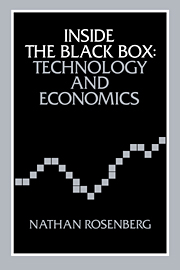Book contents
- Frontmatter
- Contents
- Preface
- Part I Views of technical progress
- Part II Some significant characteristics of technologies
- 3 Technological interdependence in the American economy
- 4 The effects of energy supply characteristics on technology and economic growth
- 5 On technological expectations
- 6 Learning by using
- 7 How exogenous is science?
- Part III Market determinants of technological innovation
- Part IV Technology transfer and leadership: the international context
- Index
4 - The effects of energy supply characteristics on technology and economic growth
Published online by Cambridge University Press: 08 January 2010
- Frontmatter
- Contents
- Preface
- Part I Views of technical progress
- Part II Some significant characteristics of technologies
- 3 Technological interdependence in the American economy
- 4 The effects of energy supply characteristics on technology and economic growth
- 5 On technological expectations
- 6 Learning by using
- 7 How exogenous is science?
- Part III Market determinants of technological innovation
- Part IV Technology transfer and leadership: the international context
- Index
Summary
A central feature of industrialization has been the utilization of increasing quantities of energy. A large part of the industrial revolution in Great Britain in the eighteenth and early nineteenth centuries may be adequately summarized as the widespread introduction of techniques for the exploitation of a new energy source–coal–in manufacturing and transportation. The spread of industrialization in the last century or so has had at its core the mastery of a sequence of technologies based upon a succession of fossil fuels–coal, oil, natural gas–and, in the twentieth century, the conversion of fuels and water power into a new energy form, electricity.
As recently as a decade ago, the intimate association between rising energy requirements and economic growth was pointed to as one of those basic facts of industrial life that had to be understood and accepted by all industrializing countries. But as yet, no minatory tone was used in making the historical association. Increasing energy use was simply one of the correlates of industrialization–like higher rates of capital accumulation, increasing education, urbanization, and declining infant mortality–that had to be appreciated and planned for if a country was to achieve economic growth.
The decade of the 1970s has, of course, changed all that. The impact of the Arab oil embargo and the subsequent emergence of OPEC as the most powerful cartel in history have focused attention as never before upon the question of energy supply.
- Type
- Chapter
- Information
- Inside the Black BoxTechnology and Economics, pp. 81 - 103Publisher: Cambridge University PressPrint publication year: 1983
- 3
- Cited by



